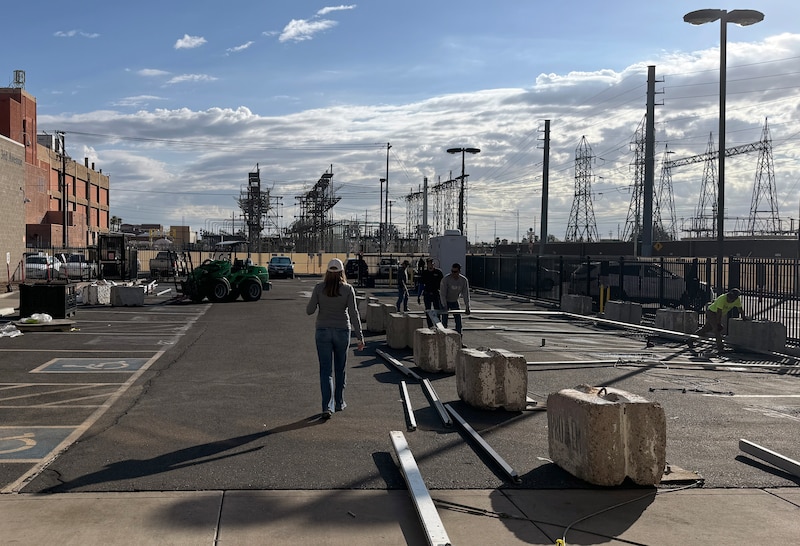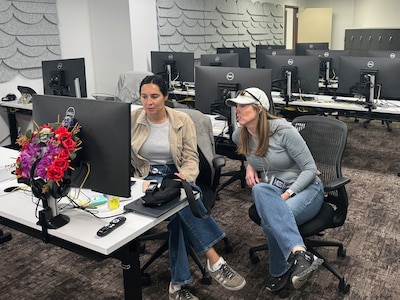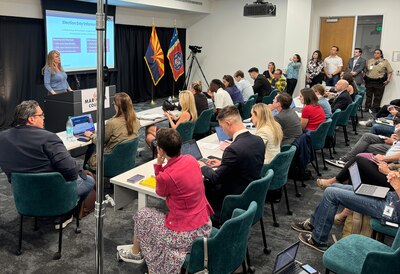Votebeat is a nonprofit news organization reporting on voting access and election administration across the U.S. Sign up for Votebeat Arizona’s free newsletter here.
It’s Sunday morning before the big event, and Jennifer Liewer is standing outside the elections center in downtown Phoenix, inspecting a metal tent frame that contractors are erecting in the parking lot.
“I told him to make it bigger,” she tells a colleague. “I’m not sure if this is the ‘bigger.’”
Liewer, Maricopa County’s deputy elections director for communications, knows hundreds of journalists from around the world will be here on Election Day, working in this tent. To be able to do her job then, she needs to be a logistics manager now, directing trucks and workers, while ensuring that voters can still drive up to the ballot drop box in the parking lot.

The last two federal elections, county officials were caught by surprise when worldwide media attention turned toward Maricopa. After 2020, journalists arrived to watch allies of Donald Trump recount all 2.1 million ballots cast in the county after Trump claimed, without evidence, that the election was rigged against him. Then, on the day of the midterm election, widespread technical failures at the polls spurred similar claims of fraud, this time from failed GOP gubernatorial candidate Kari Lake.
This year, Trump and Lake were both back on the ballot. Arizona — and especially Maricopa, the country’s largest swing county — was predicted to help decide the presidential election. Nearly 700 journalists applied for credentials. Liewer and her colleagues knew this was an opportunity to help restore public trust in elections in the most scrutinized county in one of the most closely watched states.
The county brought on more staff to handle media requests, sent a packet to reporters in advance detailing how the county runs its elections, prepared a live fact-check page on its website, required journalists working from the elections center tent to obtain credentials, and spent $35,000 to set up the media tent and bathrooms in the parking lot.
Liewer allowed Votebeat to shadow her in the days leading up to her Election Day gantlet.

On Sunday, her phone buzzed repeatedly as she met with colleague Ali Flahive in a room serving as a communications command center. Soon, anyone responsible for election messaging would be sitting at the rows of tables, fitted with computer monitors. Two projector screens at the front of the room would soon show wait times at the polls, and a running list of pending media inquiries. On the wall were framed black-and-white signs with quotes from Scott Jarrett, one of the county’s two elections directors.
“THIS IS The Super Bowl of Elections,” one said.
“WE ARE The Belle of the Ball,” another declared.
County officials didn’t ask for this attention, but they’re getting used to it.
‘Cut through the noise’: Maricopa County officials fight back
In 2020 and 2022, Liewer watched from behind the scenes as a spokesperson for the county attorney’s office. When she stepped into her role last year, she knew what she was getting into.
It’s not her first high-pressure role, and she’s often found herself responding to crises. Just out of college, she began working for the American Red Cross in Phoenix and was called to New York after the 9/11 attacks. She was spokesperson for the city of Glendale when it hosted the 2008 Super Bowl and responded to high media interest about financial problems, and later for the Arizona Supreme Court as the elected county attorney faced disciplinary proceedings. She started in the county attorney’s office under Allister Adel in 2019, and represented the office as Adel publicly battled alcoholism.
And she was there in 2022, when the office commissioned an outside investigation of the Election Day problems. The next year, when the communications role opened, she knew she could handle it.
“Here, we are all doing it together, and the chaos is on the outside,” she said, sitting in her office on the Sunday before the election. It’s not lost on her that she is now coordinating media arrangements and messaging for what Jarrett calls the “Super Bowl of elections,” when she once did the same for the actual Super Bowl. Of course, the stakes for the presidential election are a little different.
She’s watched county election officials manage all the twists and turns of the past four years, and she uses that information to anticipate what’s coming her way.
For a while, the county took a “backseat approach” to communications, said Supervisor Bill Gates. That was true even as state Senate Republicans subpoenaed every ballot cast in the county’s 2020 election for what they called an audit.
But the strategy shifted quickly.
In May 2021, the Senate’s contractors, Cyber Ninjas, falsely accused the county’s workers of deleting election files. County Recorder Stephen Richer, a Republican, had been reserved until then, but when Trump echoed that false claim on social media, Richer responded on Twitter, calling it “unhinged.” That’s around when the typically mild-mannered Supervisors Chairman Jack Sellers, a Republican, began to call the audit a “grift.”
From then on, the county’s tone changed.
“We thought, ‘That’s enough. We can’t remain silent,’” Gates recalled. “And that’s been the motivation ever since. It’s about defending the team, defending our workers.”
County Communications Director Fields Moseley began to transform the county’s sleepy social media account with live fact-checking, plus some snark, aimed at the auditors.
“#RealAuditorsDont: Assume guilt and post false information like it’s a Season 1 cliffhanger,” the account tweeted on May 14, 2021.
It was their way to “cut through the noise,” said Zach Schira, Gates’ chief of staff at the time and now an assistant county manager overseeing elections. “There was no other answer.”
The 2022 midterms: A setback on Election Day
As the 2022 midterm election approached, the county adopted a strategy from its COVID-19 response and set up a command center for the first time.
“Immediacy is top concern,” a draft county communications plan from the time said. “Rumors/misinformation should be addressed ASAP.”
Leading up to the election, county officials were holding weekly press conferences. Then, when polls opened on Election Day, they found themselves contending with a significant problem: Tabulators across the county weren’t accepting ballots, and county officials had to tell reporters they didn’t know why.
That night, reporters filled the lobby of the elections center to question officials. The officials explained that the problem was with the ballot printers, not the tabulators, but didn’t provide details that night — or for months. The lack of immediate answers allowed conspiracy theories to flourish.
Voter confidence took another hit.
Afterwards, to shore it up, the county started to more aggressively push public tours of the elections center. Officials hosted about 100 tours this year alone so far, in between running elections. The county also spent $1.8 million on paid TV, radio, digital, and social media ads and billboards this year, trying to get information about voter registration, mail ballots, and other issues straight to voters before the election.
Deciding what to say, and what not to say
Behind Liewer’s desk is a sign: “Do what is right not what is easy.”
When pressure hits, she said it’s important for her to be honest about what’s happening, while still respecting her team’s opinions on what information they aren’t prepared to share. If she can’t talk about something, she said, she is up front about that.
“I think it’s about being true to the people you work for directly, but also being true to the community,” she said.
Of course, not everyone agrees on “what is right” — or that the county has gotten its communications efforts right in the past.
At times, the county has withheld information. Officials chose not to respond to the Cyber Ninjas’ questions about the 2020 election, and, after 2022, chose to wait five months, until an independent investigation was complete, to provide detailed answers about what went wrong with the ballot printers. In both instances, misinformation spread without a quick official response.
Critics have also taken aim at the county’s past requests to social media platforms to remove posts officials believe are false or harassing. And, after the county started restricting events only to credentialed media, a court ruled that it had to provide access to outlets it had banned, such as The Gateway Pundit, a right-wing website that frequently publishes misinformation. Liewer has to now take all of that into account.
‘We will not be playing whack-a-mole’: Officials lay out plan
On the Monday morning before the election, Liewer swivels in her chair at her desk as she talks to a local radio reporter from KTAR. She’s been getting media requests all morning, and she seems antsy to get off the phone. She still has to finish preparing for a press conference in a few hours, the final of three leading up to the election. Dozens of journalists are expected. She tells the reporter she has to go.
“I hope I was nice,” she says as she hangs up.
She reads through a script she’s printed out, highlighting certain comments, crossing out others.
Some reporters have gotten word that the county is experiencing delays while processing early ballots, and they’re asking her about it. A local reporter for Axios Phoenix texts her to ask exactly what results would come out at 8 p.m. election night. Would they be all early ballots received up to Friday, or Saturday?
“It’s actually neither,” Liewer says, dictating a text message into her phone. “The recorder is going to address it in the press conference this afternoon.”
Flahive stops by to let her know the staff started a new spreadsheet, this one to keep track of news broadcasters’ liveshot requests for Election Day. They are trying to get through the backlog in the media inbox, but requests are coming in faster than they can respond. Overall, from September through mid-November, a team of seven would field more than 1,000 media inquiries.

In the afternoon, more than 100 journalists sit at tables or stand behind cameras on tripods in a county conference room. The Gateway Pundit employee banned in 2022 is in the first row.
Gates, Richer, Schira, and Liewer walk to the front of the room. Moseley, the county communications director, is already there, in the back.
Schira speaks last, telling the crowd that if misinformation shows up on Election Day “we will not be playing whack-a-mole.”
“But what we will be taking very seriously is any misinformation that impacts a voter’s ability to vote a ballot,” Schira said. “That misinformation, we will be very aggressive in reporting.”
Liewer sets the stage for what the visiting reporters can expect. “Obviously, there are a lot of members of the press here,” she tells the crowd. Her staff can’t take questions from everyone, she says, but they will be there all week to help.
And with that, she opens it up to the floor.
Jen Fifield is a reporter for Votebeat based in Arizona. Contact Jen at jfifield@votebeat.org.
